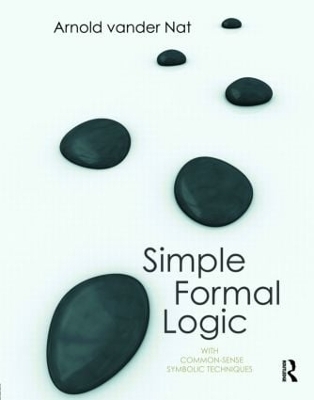
Simple Formal Logic
Routledge (Verlag)
978-0-415-99745-4 (ISBN)
Perfect for students with no background in logic or philosophy, Simple Formal Logic provides a full system of logic adequate to handle everyday and philosophical reasoning. By keeping out artificial techniques that aren’t natural to our everyday thinking process, Simple Formal Logic trains students to think through formal logical arguments for themselves, ingraining in them the habits of sound reasoning.
Simple Formal Logic features:
a companion website with abundant exercise worksheets, study supplements (including flashcards for symbolizations and for deduction rules), and instructor’s manual
two levels of exercises for beginning and more advanced students
a glossary of terms, abbreviations and symbols.
This book arose out of a popular course that the author has taught to all types of undergraduate students at Loyola University Chicago. He teaches formal logic without the artificial methods–methods that often seek to solve farfetched logical problems without any connection to everyday and philosophical argumentation. The result is a book that teaches easy and more intuitive ways of grappling with formal logic–and is intended as a rigorous yet easy-to-follow first course in logical thinking for philosophy majors and non-philosophy majors alike.
Arnold vander Nat is Associate Professor of Philosophy at Loyola University Chicago. He has taught courses at the introductory, intermediate, and advanced levels in logic, epistemology, and early modern philosophy.
Chapter 1: Basic Logical Concepts 1.1 Introduction 1.2 Arguments 1.3 Evaluating Arguments 1.4 Classification of Sentences 1.5 Proofs, Inconclusive and Erroneous Arguments 1.6 Deductive and Inductive Validity Chapter 2: Propositional Logic 2.1 Introduction to Propositional Logic 2.2 Details about Negations 2.3 Details about Conditional Sentences 2.4 Determining the Truth-Value of Sentences 2.5 Truth-Tables to Test the Validity of Arguments 2.6 Truth-Table Tests for Other Logical Concerns 2.7 Presentation of the Rules of Deduction 2.8 Making Deductions for Arguments 2.9 Strategy in Deductions 2.10 The Rules of Conditional Proof and Indirect Proof 2.11 Further Uses of Deductions Chapter 3: Traditional Logic 3.1 Introduction: New Perspectives 3.2 Categorical Sentences in Traditional Logic 3.3 English Variations on Categorical Forms 3.4 Venn Diagrams for Categorical Sentences 3.5 Venn Diagrams for Syllogisms and Equivalences 3.6 Equivalence Operations 3.7 Deductions in Traditional Logic 3.8 Combining Propositional Logic with Syllogistic Logic Chapter 4: Modern Quantificational Logic 4.1 Introduction to Quantificational Logic 4.2 Types of English Simple Sentences and Other Detail 4.3 The Truth-Value of Quantificational Sentences 4.4 Deductions in Quantificational Logic 4.5 Deductions with Conditional Proof and Indirect Proof 4.6 Demonstrating Invalidity 4.7 Relational Sentences 4.8 Deductions with Relational Sentences 4.9 Working with Identities Chapter 5: Logical Fallacies 5.1 Introduction 5.2 Fallacies of Irrelevance 5.3 Fallacies of Misconstrual 5.4 Fallacies of Presumption Glossary and Index of Terms, List of Symbols and Abbreviation
| Erscheint lt. Verlag | 18.1.2010 |
|---|---|
| Zusatzinfo | 50 Tables, color |
| Verlagsort | London |
| Sprache | englisch |
| Maße | 203 x 254 mm |
| Gewicht | 2000 g |
| Themenwelt | Geisteswissenschaften ► Philosophie ► Allgemeines / Lexika |
| Geisteswissenschaften ► Philosophie ► Logik | |
| ISBN-10 | 0-415-99745-3 / 0415997453 |
| ISBN-13 | 978-0-415-99745-4 / 9780415997454 |
| Zustand | Neuware |
| Haben Sie eine Frage zum Produkt? |
aus dem Bereich


